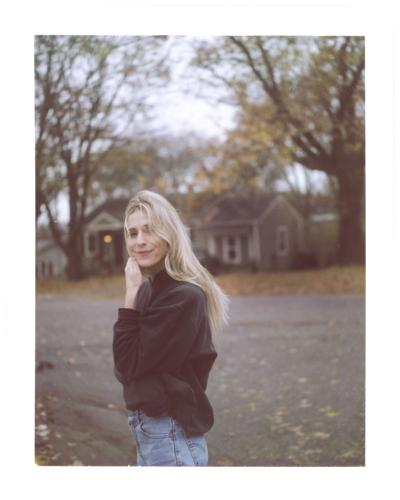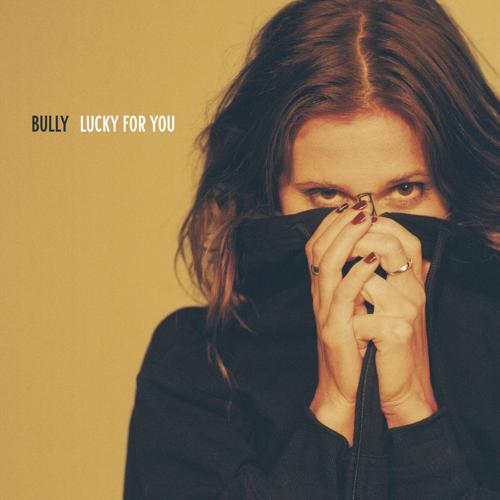It was clear that Alicia Bognanno and her rock-and-punk project Bully meant business when they emerged on the scene in 2013. It didn’t take long for the rest of the world to catch on: Bully’s 2015 debut album Feels Like resonated with fans and critics far beyond Nashville. Bognanno has worked exceptionally hard to grow from a gifted young musician to a top-notch singing, songwriting, producing, multi-instrumentalist rock ’n’ roll force of nature. All this she did while evolving Bully from a band to a solo project, navigating the music industry, living through the Trump administration, treating mental illness and more.
Released in June, Bully’s fourth LP Lucky for You — Scene writers’ No. 1 pick in our Top Local Albums Poll — showcases the whip-smart, vulnerable songwriting and post-grunge textures that have been Bognanno’s calling card while making room for ever more sonic experimentation. We caught up with Bognanno to discuss Bully’s first decade and the start of its next. Our interview has been edited for length and clarity.
This year, you’ve been on the road at different times with The Breeders and the Pixies, two bands who’ve been big influences on you. What did you take away from that?
When I played with The Breeders, it was pretty nerve-racking because I actually played a few songs onstage with them. I think it would be different if I was there just enjoying it. … But [it was] really great, and I love them — and incredible to see, because Pod is my favorite record of all time. But the Pixies tour was really awesome, too.
[Brief interruption as Bognanno’s dog Papa joins us.] He doesn’t like being away from me, and now that I take him on tour, he’s even more like, “Why aren’t we going everywhere together?”
But something that I can take away from [these tours] is basically just to soak up every minute of it. I watched the show every night on tour and just really made sure that I didn’t take any of it for granted. And I feel really glad that I did that, because I think lots of times when you’re touring, stuff can be so chaotic and you kind of forget to enjoy it.
Fans know that your other longtime pup Mezzi died last year, and grieving her loss is the central theme of Lucky for You. Since her death, you’ve been fostering dogs.
It’s a little more intense than I feel like you would imagine, just because a lot of these dogs that are coming in — you don’t really know if they’re house-trained, or what their experiences are, where they came from. I feel like a lot of dogs that I’ve had, it seems like they’ve never lived in a home before. So it’s a learning process. …
I feel like it’s almost my responsibility to [foster] — now that Mezzi is gone, it feels like if I’m able to, then I should. Because I feel fortunate that, while I’m in town and home, I can kind of make my own schedule. … A comment that is made quite frequently is people saying they would love to [foster], but they feel like they get too close and stuff. And it’s difficult — that’s a very real thing. Even though parts of it really help me, I just try and keep in mind that it’s not really for me, it’s kind of for them.

Two threads stand out in your work. Writing the music and lyrics is very personal and intimate, so that’s a solo endeavor. For your two most recent albums, though, you’ve put the recording process in another producer’s hands — John Congleton for 2020’s Sugaregg and JT Daly for Lucky for You.
I went into [Sugaregg] with demos that ended up being similar to the final product. [Lucky for You] was really the first time that I felt like I collaborated with somebody, and I’m so grateful that I did. I actually went over to [Daly’s] house the other day, and I was like, “This is the first time in my musical career that I feel like I can just come here and be vulnerable in front of somebody else.” I think that’s a lot to do with why I did my own records for so long — I was just embarrassed having someone else in the room because it is so personal, and it’s, like, uncomfortable with lyric stuff. … My favorite takeaway from that was just how close JT and I got, and now it’s like, I’m friends with him and his family. And just having another close person in my life where we could bond.
When I started [Lucky for You], the reason why I was so open to being more open was because I could tell off the bat that JT was a genuine fan, and he really appreciated the authenticity. And so he wanted to preserve it, you know, he didn’t want to change it. He just wanted to accentuate it and make it better. …
Something that is really exciting to me at this point in my life — having done this for 10 years — is that everything just turned into this larger experiment. [That] fulfills me now, whereas 10 years ago, I would probably be a little scared to do it. I feel like you start, and you do your record, and then — Feels Like did really well. And then the second record, you have all these expectations of what you’re supposed to do, and voices of, like, who has said what about previous records. … The third record, I really started entering into the territory of just kind of prioritizing doing what I want and being less insecure about how it might be perceived. And then with Lucky for You, it just keeps getting more enjoyable for me. I just, with every record, consider less and less of what people might think, and think about what is fulfilling to me.
And at this point it’s really important for me to try something new with every record, because I feel like that’s really the only way you can learn and grow from it. And so, even if you tried something and it didn’t work, it’s like, at least you put yourself in that situation, and you can kind of analyze how you responded. …
With “Hard to Love,” I was so insecure about that song coming out, because I thought it was kind of poppy. … I wrote that song telling myself, ‘OK, I’m going to use all instruments I’ve never used before, except for bass.” And so I was messing with synths and I was messing with sound. And I just never thought that would be something that would come out, because it’s really far from what I’ve done in the past. So after I had JT, and even the label, [say] “This is a great song, you should do it” — putting something like that out there, I was really terrified because I was afraid I was going to be judged, or people be like, “This isn’t what we’re used to.” And it actually ended up being great.

You’ve been doing more production work for others — one big project being The Mountain Goats’ 2022 album Bleed Out. Is producing and engineering something you want to pursue with intent, or just let happen when it happens?
I think it happens when it happens. I think that if it’s the right fit, then I would love to. But nothing is as fun to me as sitting alone in my room making music. I just kind of love that. So production and engineering is secondary to that a lot of times. Even thinking about this next record, I have had the idea of, “Maybe I’ll go back to [Steve Albini’s studio] Electrical Audio, and get drums on tape and in the room, and see what that’s like.” And when I want to do that, a lot of it is just selfishly — I just want to do it again, because I miss it. But yeah, I would say if the project is right — and I feel like [the client is] gonna get something out of it and I am as well — then I’m definitely open to it.
The Mountain Goats relationship has been so cool and interesting. I did that record, and then they asked me to play on the following record. And now where they’re a duo — it’s just Matt [Douglas] and John [Darnielle], and then Craig [Finn] from The Hold Steady is solo, and then I’m opening solo. So it’s all just been this new, fresh set of things that I’ve never done before in my life. … I feel really lucky that they’re so supportive of me, and even that they consider me to be a part of their project in any capacity, even if it was just for the two records.
[Making Bleed Out], we were going to kind of figure it out as we go. And it was really cool watching people who have been doing this, you know, for 30 years now, not overthink every detail and have faith in each other as far as what they’re playing. And just being able to kind of keep yourself away from the rabbit hole that you could get in. That was so cool and important for me, because since I do work alone, it’s really easy for me to just spiral and overthink and overanalyze everything. … I really learned a lot from it outside of just producing, and really just being around them and watching the way they work — and watching John be OK with figuring out a song that day and doing it and then moving forward.
A fair number of musicians have left Nashville recently, whether to pursue new opportunities or escape economic pressures or social issues. Does Nashville still make sense as a home base for you?
Not really — I feel like the majority of the people I work with are in California. … I’m lucky my landlord and I have a good relationship, because I’ve been in my house for eight years, and she hasn’t raised my rent. So it’s really incredible. Eight years ago, that was one of the benefits of being a musician in Nashville: It was possible to rent a house, or have a trailer in your driveway, or have outdoor space. For me, that’s crucial to writing, because that’s how I take my breaks, I go sit on my back porch. [In] a lot of other major markets and cities, your options are kind of limited to apartments, and you can’t make noise. And so for me, that’s just not even an option.
Nashville has been really good to me in that way, and I really love where I’m at. … A majority of people that I’m friends with have left, [and] a lot of friends that I’ve made live in different places, because I’ve met them on the road — we’re all kind of transitional. I think, though, the only place I would want to go is California, and that would be to be in the sun and by the water. And I mean, that’s even more expensive than Nashville. [Laughs] Having done this in the scene for 10 years, it is kind of crazy watching it change and shift. And you have people like Margo [Price] who’ve been around forever, and being able to watch them grow and stuff. It’s really cool to be in a specific place among a similar group of people, and just kind of watch everybody grow.
Talking with Bully’s rock ’n’ roll polymath Alicia Bognanno, counting down the year’s top local albums and more
There is an exact moment on Bully’s new record Sugaregg, out Friday via Sub Pop, when everything clicks into place. Partway through “Hours and…


